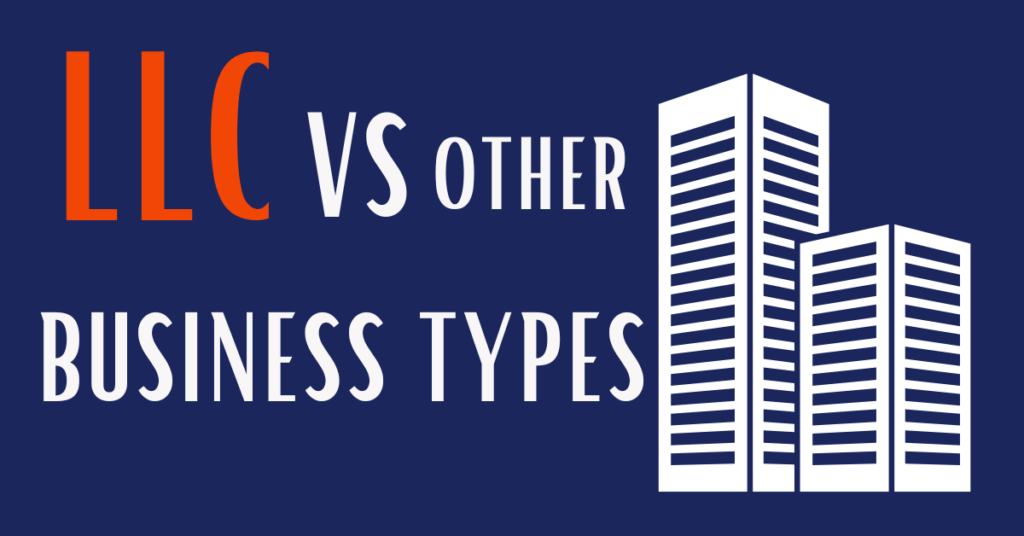When you purchase through our links, we earn commissions at no extra cost to you.
Choosing the correct business structure is one of the most important considerations when establishing a new firm. Limited Liability Companies (LLCs) are becoming increasingly popular because of their flexibility, liability protection, and relatively simple establishment process. However, what are the different types of LLCs? Not all LLCs are made equal; some forms of LLCs are better suited to specific company needs and goals. Understanding the different LLC forms and how they relate to other business types, such as sole proprietorships, partnerships, corporations, and organizations, is critical for making an informed choice.
In this blog article, we will discuss the many forms of LLCs. We’ll also compare LLCs to other business structures to help you understand why many entrepreneurs use an LLC and when another structure may be more favorable.
What is an LLC?
An LLC, or Limited Liability Company, is a kind of business entity in the United States that incorporates characteristics of both corporations and partnerships/sole proprietorships. It offers liability protection to business owners, which means that their personal assets (such as houses, vehicles, and bank accounts) are usually protected from any business responsibilities or legal claims against the company. This is comparable to the protection that a corporation offers to its stockholders.
At the same time, an LLC allows for more administration and tax freedom. An LLC can be taxed as a sole proprietorship, partnership, S corporation, or C corporation, allowing its owners to pick the tax structure that best meets their company goals. Because of their flexibility, LLCs are an increasingly common option among small business owners and entrepreneurs.
You may need to read our article on how to start an LLC. Click here.

What Are the Different Types of LLCs?
When creating an LLC, choosing the appropriate structure is critical since it affects how the company runs, its legal protections, and its tax duties. Here’s an overview of some of the most popular types of LLCs and their advantages:
Single-Member LLC.
A Single-Member LLC is owned and managed by a single individual. It offers liability protection comparable to a corporation while maintaining the ease and flexibility of a single proprietorship. This structure is appropriate for individual entrepreneurs seeking limited liability without the complexities of creating a corporation. The owner declares profits and losses on their own tax return to prevent double taxation.
Multi-member LLC
A Multi-Member LLC is an entity having multiple owners at a time. It provides the same liability protection as a single-member LLC, but ownership and management obligations are shared by the members. This sort of LLC is commonly used by smaller companies with many partners. Members can select between a member-managed structure, in which all owners participate in daily activities, and a manager-managed structure, in which appointed managers handle operations.
Domestic LLC
A Domestic LLC operates in the state in which it was founded. This is the most popular and straightforward form of LLC, making it appropriate for companies that intend to operate mostly inside their home state. It is relatively easy to set up and run, requiring only minimum state compliance and filings.
Foreign LLC
A Foreign LLC is an LLC that was founded in one state but is registered to operate in another. For example, if an LLC is formed in Texas but conducts business in New York, it must be registered as a foreign LLC in New York. This structure enables enterprises to grow beyond their home state while retaining their original founding state.
Professional (PLLC)
A Professional LLC is intended for licensed professionals, including doctors, lawyers, and accountants. Due to particular restrictions governing professional behavior, many jurisdictions require professionals to incorporate a PLLC rather than a traditional LLC. A PLLC offers the same liability protection as an LLC, but with extra compliance obligations to protect customers while maintaining professional standards.
Series LLC
A Series LLC is a distinct structure that enables the formation of many “series” or divisions inside a single LLC. Each series works as an independent entity with its own assets, liabilities, and members. This structure is useful for businesses that desire to separate their company activities or investments in order to protect themselves from the liabilities of others.
Restricted LLC
Restricted LLCs are a unique form of entity created for estate planning goals. These LLCs are not permitted to transfer profits to members for a particular period of time (usually ten years). Instead, profits must be reinvested in the business, which can help to protect assets and defer taxes for a period of time.
Low-profit LLC (L3C)
The L3C is a hybrid form which combines the advantages of an LLC with a nonprofit’s social target. It is intended to achieve a socially beneficial aim instead of maximize profits. L3Cs appeal to investors seeking social impact investments since they can take donations and attract charitable funds while maintaining limited profit-making operations.
Nonprofit LLC
A Non-profit LLC is formed to benefit philanthropic, educational, or religious activities. Unlike regular nonprofits, this sort of LLC can make a profit; however, all profits must be reinvested in the nonprofit’s objective rather than distributed to members. Forming a nonprofit LLC can provide members with liability protection while also pursuing a socially beneficial objective.
Create your LLC with our trusted partner Bizee
Bizee
Trusted by over million business owners
- Company name verification
- Free first year registered agent
- Lifetime company alerts
- Free business tax consult
- Lifetime customer support

LLC vs Other Business Entities
When determining how to establish your new business, it’s critical to grasp the distinctions between Limited Liability Companies (LLCs) and other business structures. Each business form has unique advantages and disadvantages, affecting everything from liability protection to tax responsibilities. Let’s look at how an LLC compares to other common types of businesses to help you choose the best option for your entrepreneurial path.
sole proprietorship
A sole proprietorship is the most basic type of business structure, appropriate for individual entrepreneurs beginning small. Unlike an LLC, there is no requirement for official registration or establishment documents. The proprietor and the company are legally regarded as the same thing; hence, the owner is individually liable for all obligations and debts. While this structure simplifies tax filing by reporting business revenue on the owner’s personal tax returns, it does not provide liability protection. Sole proprietors also do not have the option of selecting a tax classification, but LLCs can choose to be taxed as a corporation or a pass-through company.
Partnership
A partnership consists of two or more persons who share ownership, revenue, and responsibilities. Partnerships may take many different forms, including General Partnerships (GPs), Limited Partnerships (LPs), and Limited Liability Partnerships. In a General Partnership, all partners have equal power and obligations, whereas Limited Partnerships include both general and limited partners, with the latter having less control and liability. An LLP, on the other hand, provides liability protection to all partners, much like an LLC.
Partnerships, like LLCs, are pass-through businesses under tax law, which means that income and losses are recorded on individual tax returns. However, partnerships may not provide the same amount of flexibility or liability protection as LLCs, especially when personal assets are at risk in a General Partnership.
Corporation
A corporation is a more complex and formalized type of business that is regarded as a separate legal entity from its owners (shareholders). There are several kinds of corporations:
- C Corporation (C-Corp): A conventional corporation in which owners have minimal liability protection but are taxed twice: once at the corporate level on earnings and again at the shareholder level on dividends.
- S Corporation (S-Corp): Provides similar liability protection to a C-Corp, but with a distinct tax benefit. S-corporations are pass-through businesses, which means that income is taxed at the shareholder level rather than the company level. But S-Corps have stricter operating standards, as well as limits on the number and kind of shareholders.
- B Corporation (B-Corp): A relatively new form of corporation that emphasizes social responsibility and ethical behavior. B-Corps are for-profit businesses that have been accredited to fulfill high criteria of social and environmental performance, accountability, and openness.
- A Closed Corporation: It is a privately owned business with a small number of owners that does not normally issue shares to the public. This structure allows for greater managerial freedom while also being excluded from certain of the laws that govern publicly listed businesses.
Corporations, compared to LLCs, offer more liability protection and substantial tax benefits, particularly if you choose the S-Corp tax classification. However, they also impose additional legal requirements and processes, which can be inconvenient for small business owners.
Nonprofit Organization
A Nonprofit Organization is intended for entities that operate for the public interest rather than profit. These organizations can be formed as companies or partnerships, but they must fulfill certain IRS requirements to be tax-exempt. Nonprofits cannot distribute earnings to members or directors, and they must follow rigorous rules on political activity and private revenue. While LLCs are intended for profit-driven endeavors, nonprofits focus on social, philanthropic, educational, or religious activities and enjoy tax benefits not available to for-profit corporations.
Cooperative
A cooperative (co-op) is an organization that is owned and governed by the people who utilize its services. Co-ops are frequently created by members in industries such as agriculture, retail, and housing. Co-ops are run democratically, with earnings dispersed among members. Unlike LLCs, which can change their ownership and management structure, cooperatives take a more community approach, focusing on member engagement and benefit. Co-ops are subject to numerous taxes and regulations, but they do not provide the same amount of liability protection as LLCs.
Choosing the Right Structure
Choosing the right business structure is an important choice for any investor. The decision has an impact on many facets of your organization, including responsibility, taxes, and administration. While Limited Liability Company (LLC) is a popular choice owing to its flexibility and protection, other company forms, such as sole proprietorships, partnerships, corporations, non-profit organizations, and cooperatives, each have their own set of benefits and obstacles. Always consult with a legal or financial professional to determine the best fit for your business.
Considerations for Choosing the Right Structure
- Liability Protection: Determine the degree of risk associated with your business and if you require personal liability protection. If protecting your personal assets from company obligations is critical, an LLC or corporation is the best option.
- Tax Implications: Tax responsibilities vary depending on the business structure. LLCs and S-corps, for example, provide pass-through taxation, which can assist in avoiding double taxation, whereas C-corps must pay corporation taxes as well as shareholder dividend taxes. Understanding the effects can help you maximize your tax approach.
- Management Flexibility: Think about how much authority you desire over decision-making and everyday operations. LLCs have more flexible management structures than corporations, which have more rigorous, formalized management standards.
- Cost and complexity: Determine the cost of establishing and sustaining the business structure. Sole proprietorships and partnerships are cheaper to create and manage than limited liability companies (LLCs) or corporations, which need additional paperwork and regulatory compliance.
- Purpose and goals: Consider your company’s long-term dreams. If you want to grow, acquire investors, or go public, a corporation might be a better option. For small enterprises or those who want a more uncomplicated structure, an LLC or partnership may be more appropriate.










